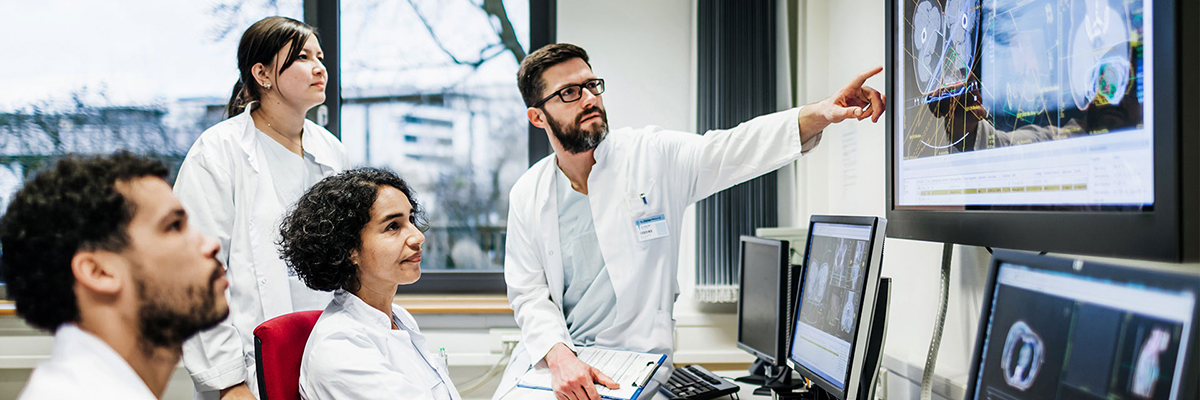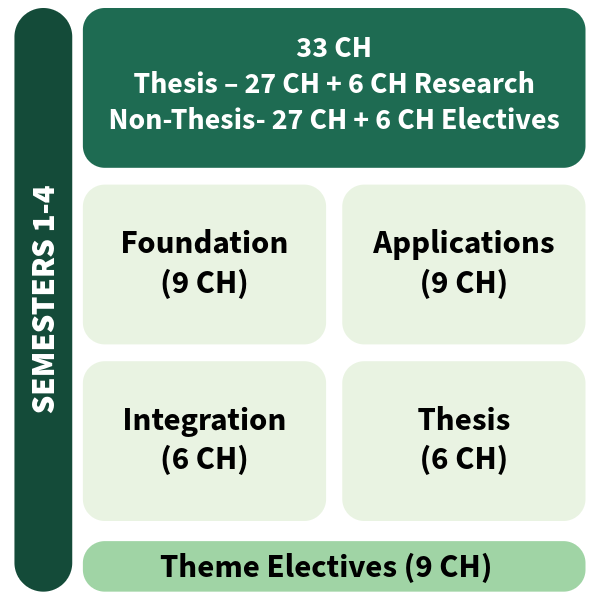
Discover UAB's MS in AI in Medicine program, where cutting-edge AI technology converges with transformative applications in healthcare, preparing you to lead innovation in the future of medicine.
-
Advanced Skills in AI Technology: Gain specialized knowledge and hands-on experience in artificial intelligence, leading innovations in healthcare technology.
-
Integration of Medical and Technological Expertise: Benefit from an interdisciplinary approach that merges insights from medicine and AI, allowing for impactful roles at the intersection of healthcare and technology.
-
Access to Cutting-Edge Research Opportunities: Engage in groundbreaking research projects that address real-world healthcare challenges, guided by faculty who are leaders in their fields.
-
Career Readiness: Graduate with a competitive edge, ready to pursue careers in medical imaging, diagnostics, personalized medicine, and other AI-driven healthcare fields.
-
Networking and Industry Connections: Leverage UAB's strong partnerships with medical institutions and tech companies for networking, internships, and potential career opportunities in the healthcare industry.
Why Choose Our MS in AI in Medicine?
-
Cutting-Edge Curriculum: The program offers a curriculum that combines the latest in artificial intelligence (AI) technology with practical applications in medicine, ensuring students are well-prepared for the rapidly evolving field.
-
Expert Faculty: Students learn from experienced faculty who are leaders in both AI and medical fields, providing a unique blend of expertise and mentorship.
-
Research Opportunities: UAB is known for its strong research programs. Students in the MS in AI in Medicine program have opportunities to engage in groundbreaking research projects, often with direct applications in healthcare.
-
Location: Located in Birmingham, UAB is part of a vibrant medical and technological community, providing additional opportunities for collaboration and professional growth.
What You Will Learn
-
Foundations of AI in Medicine: Understand the basic principles and techniques of artificial intelligence and how they are applied to solve medical problems.
-
Technical Aspects of Deep Learning in Medicine: Explore the technical foundations of deep learning, including neural network architectures and their applications in medical research and practice.
-
AI in Medical Imaging: Study the use of AI to enhance medical imaging techniques, such as MRI and CT scans, for improved diagnosis and treatment planning.
-
AI for Biomedical Signals & Critical Systems: Analyze how AI can be used to interpret biomedical signals and manage critical systems, improving patient monitoring and intervention.
-
Large Language Model (LLM) Development for Medical Data: This course aims to equip students with both the theoretical knowledge and practical skills needed to navigate the rapidly evolving landscape of healthcare focused LLMs.
-
Reinforcement Learning for Clinical Decision Making: Learn about reinforcement learning techniques and how they can be applied to support clinical decision-making processes.
-
Advanced Natural Language Processing (NLP) in Medicine: Delve into advanced NLP methods for processing and understanding medical texts and records, facilitating better information extraction and communication.
-
Privacy and Security in Healthcare: Learn about the crucial aspects of data privacy and security, including regulations and best practices for protecting patient information in AI applications.
-
Leadership & Ethics for AI in Medicine: Develop leadership skills and ethical decision-making frameworks for the responsible deployment of AI technologies in healthcare settings.
-
Integration of AI Systems in Healthcare: Gain expertise in integrating AI systems into existing healthcare infrastructures, ensuring compatibility and efficiency.
-
Program Electives: Choose from a variety of specialized electives to tailor your learning experience to your interests and career goals.
What to Expect
-
Hands-On AI Projects: Engage in practical projects and labs focused on applying AI technologies to solve real-world medical problems, using tools like Python, TensorFlow and medical imaging software.
-
Interdisciplinary Collaboration: Work closely with peers, faculty, and healthcare professionals in interdisciplinary teams to develop and implement AI solutions for healthcare challenges.
-
Access to Advanced AI Facilities: Utilize state-of-the-art labs equipped with high-performance computing resources, AI development platforms, and medical datasets for research and experimentation.
-
AI-Focused Networking Opportunities: Attend AI-specific workshops, seminars, and conferences to network with industry leaders, AI researchers, and potential employers in the field of AI in medicine.
Benefits
-
Direct Interaction with AI Experts: Benefit from face-to-face interactions with faculty who are leading experts in AI and its applications in medicine, receiving personalized guidance and mentorship.
-
Enhanced AI Learning Experience: Experience the advantages of in-person learning, including immediate feedback on AI projects, interactive coding sessions, and collaborative problem-solving.
-
Stronger AI Peer Connections: Build lasting professional relationships with classmates and peers through collaborative AI projects, hackathons, and AI-focused social events.
-
Immediate Access to AI Resources: Access to campus facilities, such as AI research centers, specialized AI software, and technical support services, enhancing your ability to conduct cutting-edge AI research and development.
Who Should Apply?
-
Background in Medicine, Statistics, Computer Science, Mathematics & Biomedical Engineering/Engineering
-
Healthcare Professionals (with a programming background)
-
Please note: Students should have proficiency with Python as programming is a requirement to be successful in the program.
Join a dynamic community at UAB, where interdisciplinary learning and hands-on research opportunities in AI and medicine prepare you to shape the future of healthcare.
Curriculum
Plan I Option – Thesis Track
-
Courses
HCI 611: Foundations of Artificial Intelligence in Medicine HCI 613: Leadership and Ethics for Artificial Intelligence in Medicine HCI 614: Integration of Artificial Intelligence into Clinical Workflow HI 620: Security and Privacy in Health Care AIM 641: Technical Introductions to DL in Medicine AIM 642: AI for Medical Imaging AIM 643: AI for Biomedical Signals and Systems AIM 646: Build LLMs for Medical Data AIM 645: Advanced NLP THESIS: Dissertation Research
Plan II option – Non-thesis Track
-
Courses
HCI 611: Foundations of Artificial Intelligence in Medicine HCI 613: Leadership and Ethics for Artificial Intelligence in Medicine HCI 614: Integration of Artificial Intelligence into Clinical Workflow HI 620: Security and Privacy in Health Care AIM 641: Techinical Introductions to DL in Medicine AIM 642: AI for Medical Imaging AIM 643: AI for Biomedical Signals and Systems AIM 644: RL for Clinical Decision Making (Elective) AIM 646: Build LLMs for Medical Data AIM 645: Advanced NLP AIM 647: Explainable AI in Medicine (Elective)
 Tuition & Fees
Tuition & Fees
View UAB's Tuition and Fees.
Application Deadlines
-
August 1 — Fall semester
-
December 1 — Spring semester
MS AI in Medicine program will launch its first cohort in the spring 2025.
International students requiring a student visa can apply to the program starting in the fall 2025